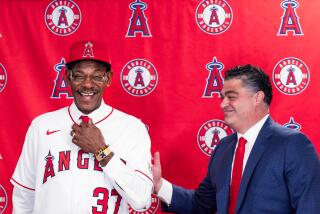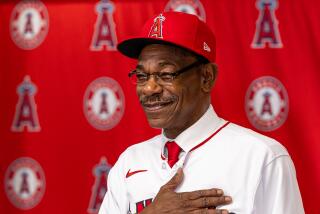Rangers Are Still Playing Musical Managers : And Because of It, Owner Eddie Chiles Has to Eat His Words About Stability
Ah, such a coincidence. The June issue of Texas SportWorld has Eddie Chiles coming right to the point about former Texas Ranger Manager Doug Rader. He does so in answer to a question about expectations for the ’85 Rangers and the length of his patience with the team’s manager.
Understand this about what Chiles says, beyond the fact that he’d prefer the words to be buried in a dry hole. The interview is dated in the customary fashion of magazines that require weeks of lead time for printing and distribution.
“I don’t know why it has become the standard procedure in baseball to fire the manager if things are not going well,” Chiles begins. “I don’t think that makes much sense.
“There are so many things that contribute to a team’s performance. You can’t blame the field manager for everything that happens on a baseball field. In other businesses, you don’t do that. You look for what’s causing the problem and you make a correction.
“Many times that deficiency might be in the ownership, the financial structure, or somewhere else in the organization. So just because the team might not do well doesn’t mean we’d blame Doug Rader.
“And it certainly doesn’t necessarily mean that he’d be fired. That’s my opinion, and that’s the way the Rangers will be run.”
Which was not necessarily the case last week when Rader was let go.
Coincidence was no less flattering to the Rangers than memory. Recall less than a year ago, the first week of June to be precise, the Rangers pressed a contract extension upon Rader. They tied him up through 1987 when the team was floundering with a 21-34 record.
President Mike Stone fielded several calls from nosy reporters who wondered why. What had Rader done to deserve it?
“We (he and Chiles) believe Doug is the perfect guy to bring a winner here,” said Stone. “With that in mind, and with the frustrating nature of our start this season, we want to do this.
“And we want to deliver a message to our fans that the instability in this organization is over.”
A suggestion,: it’s just beginning again. The same merry-go-round is circling at Arlington Stadium, along with those large, black birds that regularly fly over the place. Peace and calm are nowhere close to breaking out.
Bobby Valentine, the new skipper, must break down this team to a certain extent before putting it back together--in the manner of his choosing. The coaching staff is on lame-duck footing. Most won’t survive, just as Zimmer’s staff was swept out as Rader assembled his own group.
Every player is, to a degree, on probation. Valentine has begun to judge them one and all. They will play his way, or else they will sit and thereafter be gone. Valentine’s opinions will not coincide with those of his predecessor, and that will lead to more turnover.
Best illustration of how this works was Rader’s intemperate handling of Jim Sundberg. The catcher had been an OK guy around here for 10 years. Rader ran him off, an act he regretted many times over, but too late. The customers never forgot or forgave.
To get a handle on his roster, Valentine must play everyone. That means somebody sits. It also means they squawk. The Rangers at least challenge for the American League West lead in whines.
Dave Stewart couldn’t fathom why Rader pulled him from short relief. He felt ill-treated, pouted and wished a trade. Stewart was able to ignore an 0-3 record, 8.01 ERA and a capacity to throw fastballs that travel 400 feet.
Valentine, in time, will have to deal with the same fragile egos. He will have to determine not only who plays and who doesn’t but who hits where and why, who pitches when and why--nothing is accepted in today’s game. It must be explained and justified to the athlete.
It has already happened to Valentine in a mild way. Gary Ward did not start Valentine’s first game at the controls in Chicago and sounded huffy. The manager had to soothe and reassure him.
This will not be all one-sided. Players must endure Valentine. He’s a 35-year old rookie. He will make many mistakes through inexperience. Every previous Ranger manager would say he’s already made the most elementary error. He took the job.
More to Read
Go beyond the scoreboard
Get the latest on L.A.'s teams in the daily Sports Report newsletter.
You may occasionally receive promotional content from the Los Angeles Times.










